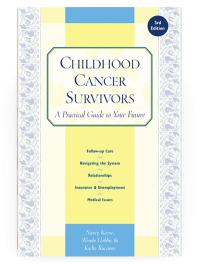Childhood Cancer Survivors
Contributors to fatigue
During treatment, the effects of drugs, surgery, and radiation can sometimes combine to cause overwhelming fatigue. Survivors hope and expect that this frustrating condition will resolve when treatment ends. Most survivors are able to resume activities with normal energy levels. Others have occasional or constant exhaustion. Cancer-related fatigue is different than being tired from normal activities because it takes less activity to tire you out, it isn’t completely relieved by sleep and rest, and it can last a long time. This unexpected and unwelcome late effect can cause physical, mental, emotional, and financial distress. At a time when you expect renewal, you find that you cannot make it through the day.
Research on cancer-related fatigue in childhood cancer survivors is fairly limited and findings have been mixed. Some studies have shown lower rates of fatigue among childhood cancer survivors when compared with survivors of cancer in adulthood, while others have found similar rates of fatigue. More research is needed to get a better understanding of how fatigue changes over time, what factors influence it, and what can be done to decrease it.
The first step in coping with fatigue is to understand that it can be a late effect of treatment. The next step is to give your healthcare provider a specific description of how the fatigue affects your life. According to clinical guidelines published in 2011, your healthcare provider should screen you for fatigue at regular intervals during and after cancer treatment, and then as needed. 1
Usually, fatigue doesn’t occur by itself. More often, it occurs along with other symptoms (called “symptom clusters”). Stress can make fatigue worse. Many factors can contribute to fatigue that persists long after treatment ends, including the following:
-
Nutritional deficiencies
-
Sleep disturbance
-
Depression or anxiety
-
Inactivity
-
Chronic pain
-
Certain medicines
-
Obesity
-
Alcohol/substance abuse
-
Hormone imbalance (i.e., thyroid, testosterone, estrogen, growth hormone)
-
Gastrointestinal problems
-
Liver dysfunction
-
Heart or lung disease
-
Kidney disease
-
Low red blood cell counts (called anemia)
Most often, the exact cause of persistent fatigue is unknown. Fatigue can improve over time, but it can take a long time. And while it lasts, fatigue can have a far-reaching impact on every aspect of life.
I had Hodgkin’s when I was 13 and again when I was 26. I have no chronic fatigue, although I lost my stamina after the radiation in my teens due to restricted lung capacity. I can’t run more than a half mile no matter how good of shape I am in. It utterly exhausts me. I work harder than most people I know. But if I feel like taking a day off, I do. I stay healthy and take good care of myself.
I think I was unusual in that I didn’t have fatigue when I was initially treated in the early 1970s. I finished my senior year at Berkeley during radiation treatment and did my first year of graduate school during chemo. Looking back on it now, I think I was a little bit nuts. But I felt I had to keep pushing. Fatigue did not become a problem for me until the chronic heart failure began in 1997. Now every day is a battle to find enough energy. I find it hard to believe that I once saw patients from 7 in the morning until 7 at night and then often went to a meeting afterwards.
But I also know that currently my fatigue is exacerbated by depression, and I can feel a certain heaviness set in that makes the fatigue even worse when I am coping with the depression. When I get a handle on the depression (I have had lots of psychotherapy, and I sometimes take an antidepressant), my fatigue becomes much more manageable.
I think there is a real place for psychotherapy after treatment. It isn’t a sign of weakness to go in search of help, nor a sign of deep mental disturbance, but an admission that sometimes certain events are more than we can cope with. The hard part is finding a psychotherapist who can appreciate the nature of the trauma and make good interventions.
Table of Contents
All Guides- 1. Survivorship
- 2. Emotions
- 3. Relationships
- 4. Navigating the System
- 5. Staying Healthy
- 6. Diseases
- 7. Fatigue
- 8. Brain and Nerves
- 9. Hormone-Producing Glands
- 10. Eyes and Ears
- 11. Head and Neck
- 12. Heart and Blood Vessels
- 13. Lungs
- 14. Kidneys, Bladder, and Genitals
- 15. Liver, Stomach, and Intestines
- 16. Immune System
- 17. Muscles and Bones
- 18. Skin, Breasts, and Hair
- 19. Second Cancers
- 20. Homage
- Appendix A. Survivor Sketches
- Appendix B. Resources
- Appendix C. References
- Appendix D. About the Authors
- Appendix E. Childhood Cancer Guides (TM)

